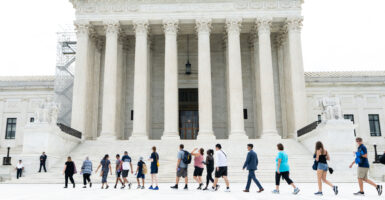Justices ruled 6-3 Tuesday in Moore v. Harper to reject the “independent state legislature theory,” the idea that legislatures have unrestricted power under the Constitution to administer federal elections without review from state courts.
The Supreme Court held that the Constitution’s elections clause “does not vest exclusive and independent authority in state legislatures to set the rules regarding federal elections.” The case stems from the North Carolina Supreme Court’s decision in February 2022 to toss a congressional map drawn by the Republican-led legislature after the 2020 census as “an egregious and intentional partisan gerrymander.”

Chief Justice John Roberts wrote for the majority, joined by Justices Sonia Sotomayor, Elena Kagan, Brett Kavanaugh, Amy Coney Barrett, and Ketani Brown Jackson.
“State courts retain the authority to apply state constitutional restraints when legislatures act under the power conferred upon them by the Elections Clause,” Roberts wrote. “But federal courts must not abandon their own duty to exercise judicial review. In interpreting state law in this area, state courts may not so exceed the bounds of ordinary judicial review as to unconstitutionally intrude upon the role specifically reserved to state legislatures by Article I, Section 4, of the Federal Constitution.”
In this case, the Supreme Court determined it “need not decide whether the North Carolina Supreme Court strayed beyond the limits derived from the Elections Clause,” affirming the judgement of the state Supreme Court.
The North Carolina Supreme Court reversed its 2022 ruling on April 28, finding that it did not have the authority to review the map under the state constitution.
As a result, the Biden administration told the justices they should dismiss the case as moot; but the legislatures argued they should still rule on it because the state court did not touch the federal “independent state legislature” question, which would likely come before the Supreme Court again.
Justices Clarence Thomas, Neil Gorsuch, and Samuel Alito dissented from the majority.
Thomas wrote that the case is “indisputably moot,” given the North Carolina Supreme Court overturned its judgment, calling the majority opinion “plainly advisory.”
Originally published at DailyCaller.com
Have an opinion about this article? To sound off, please email letters@DailySignal.com and we’ll consider publishing your edited remarks in our regular “We Hear You” feature. Remember to include the url or headline of the article plus your name and town and/or state.




























